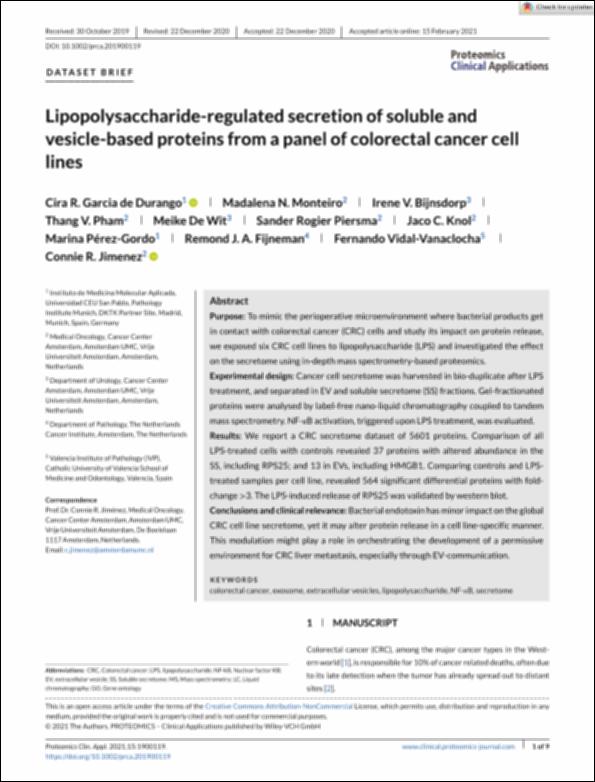Please use this identifier to cite or link to this item:
http://hdl.handle.net/10637/15432Lipopolysaccharide-regulated secretion of soluble and vesicle-based proteins from a panel of colorectal cancer cell lines
| Title: | Lipopolysaccharide-regulated secretion of soluble and vesicle-based proteins from a panel of colorectal cancer cell lines |
| Authors : | García de Durango, Cira R. Monteiro, Madalena N. Bijnsdorp, Irene V. Pham, Thang V. Wit, Meike De Rodier Piersma, Sander Knol, Jaco C. Pérez Gordo, Marina Vidal-Vanaclocha, Fernando Jiménez, Connie R. |
| Keywords: | Colorectal cancer; Exosome; Extracellular vesicles; Lipopolysaccharide; NF-κB; Secretome; Fijneman, Remond J.A. |
| Publisher: | Wiley |
| Citation: | de Durango, C. R. G., Monteiro, M. N., Bijnsdorp, I. V., et al. (2021). Lipopolysaccharide-regulated secretion of soluble and vesicle-based proteins from a panel of colorectal cancer cell lines. Proteomics Clinical Applications, 15, e1900119. https://doi.org/10.1002/prca.201900119 |
| Abstract: | Purpose: To mimic the perioperative microenvironment where bacterial products get in contact with colorectal cancer (CRC) cells and study its impact on protein release, we exposed six CRC cell lines to lipopolysaccharide (LPS) and investigated the effect on the secretome using in-depthmass spectrometry-based proteomics. Experimental design: Cancer cell secretome was harvested in bio-duplicate after LPS treatment, and separated in EV and soluble secretome (SS) fractions. Gel-fractionated proteins were analysed by label-free nano-liquid chromatography coupled to tandem mass spectrometry. NF-κB activation, triggered upon LPS treatment, was evaluated. Results: We report a CRC secretome dataset of 5601 proteins. Comparison of all LPS-treated cells with controls revealed 37 proteins with altered abundance in the SS, including RPS25; and 13 in EVs, including HMGB1. Comparing controls and LPStreated samples per cell line, revealed 564 significant differential proteins with foldchange >3. The LPS-induced release of RPS25 was validated by western blot. Conclusions and clinical relevance: Bacterial endotoxin hasminor impact on the global CRC cell line secretome, yet it may alter protein release in a cell line-specific manner. This modulation might play a role in orchestrating the development of a permissive environment for CRC liver metastasis, especially through EV-communication. |
| URI: | http://hdl.handle.net/10637/15432 |
| Rights : | http://creativecommons.org/licenses/by-nc-nd/4.0/deed.es Open Access |
| ISSN: | 1862-8354 |
| Issue Date: | 15-Feb-2021 |
| Center : | Universidad San Pablo-CEU |
| Appears in Collections: | Medicina |
Items in DSpace are protected by copyright, with all rights reserved, unless otherwise indicated.


